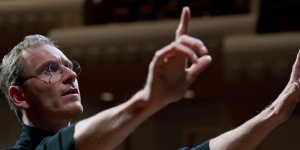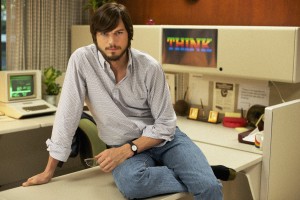Steve Jobs
Posted on October 22, 2015 at 5:01 pm
A-| Lowest Recommended Age: | High School |
| MPAA Rating: | Rated R for language |
| Profanity: | Very strong language |
| Alcohol/ Drugs: | References to drugs |
| Violence/ Scariness: | Tense and angry confrontations |
| Diversity Issues: | None |
| Date Released to Theaters: | September 23, 2014 |
| Date Released to DVD: | February 15, 2016 |
| Amazon.com ASIN: | B0168UF2PS |

If you want a straightforward, fact-checked biography of Apple visionary Steve Jobs, watch Alex Gibney’s documentary, Steve Jobs: The Man In the Machine, or the Ashton Kutcher biopic (better than its reputation), simply titled Jobs
. You can read the meticulously researched biography biography by Walter Isaacson
. This film, directed by Danny Boyle and written by Aaron Sorkin, does to the traditional biographical movie what Jobs himself did to traditional ideas about computers. A lot of people won’t like that, but for me, after years of diligent, comprehensive and increasingly formulaic biographical films, my view is that of Patrick Henry (who might have been considered a candidate for Jobs’ “Think Different” ad campaign) — If this be revolution, make the most of it.
So, let’s get it straight from the outset. A lot of stuff in this movie didn’t happen or didn’t happen when and where it is shown here or between the characters who appear in the film. And no one in history, even Aaron Sorkin, can snap out dialog as dazzlingly crafted as this in normal conversation.
This is not a “and then this happened, and then there was this revelation, and then there was this setback, and then there was this triumph” sort of movie. This movie respects its audience enough to assume that either we already know the parameters of Jobs’ life or that if we do not know the details, we are more interested in the essence. Think of it this way. It is not a photograph of Steve Jobs; it is an abstract painting. Or, it is not Julie Andrews singing “My Favorite Things;” it is John Coltrane’s 14-minute meditation on the Richard Rodgers tune. This is pure cinema, and it is thrilling to watch.
The movie takes place in three acts, three moments in real time, as Jobs (Michael Fassbender, capturing the fury, magnetism, brilliance, and shocking selfishness of the man). Jobs is backstage, preparing for three product launches: the Macintosh in 1984, the Next computer in 1988, and the iMac in 1998, after Jobs had been fired from Apple and then brought back in utter vindication to the company he co-founded. Each act is filmed (literally, mechanically shot) and scored to meld form and content.
Composer Daniel Pemberton wrote three entirely separate movie scores. The first was played exclusively on the technology of 1984. The second, reflecting the grand setting of the launch in San Francisco’s opera house and the operatic drama of the disastrous launch of a wildly overpriced product, is a full-scale symphonic piece with an Italian libretto (the lyrics are about machinery). And the third, with Jobs’ triumphant restoration to the role that meant everything to him, was composed entirely on Apple products.
Sorkin’s favorite tools are all here — hyper, rat-a-tat dialog as characters race around to meet a deadline, people who are superb at their jobs and lousy in their family and social relationships, and people who bring the trauma of their personal failures into the professional context (some vice versa as well). He moves people on and off stage at the pace of a door-slamming Feydeau farce. We see Jobs’ hyper-focus and grandiosity as he barks orders to (illegally) turn off the exit signs in the auditorium so the light won’t interfere with the total darkness he wants for the presentation and complains that he was not on the cover of TIME’s Man of the Year issue. He understands something important, not what people want because they do not know it exists, but what they will want. Computers are designed by engineers for engineers. He wants them to be not just tools but friends. He wants them — literally — to say “hello,” to be so “warm and playful” that English majors and bakers and fire fighters and musicians will want to use them. He wants an ad campaign that tells people they (all) can “think different” like Jim Henson (perfect for a generation that grew up on “Sesame Street”) and Cesar Chavez by using his products. And he wants to “make a dent in the universe.”
People who make a dent in the universe usually do serious damage to their relationships. We see that through the years as Jobs battles with his ex-girlfriend (Katherine Waterston), cruelly denying paternity of their daughter Lisa, with his longtime partner, Steve Wozniak (Seth Rogen), his programmer (Michael Stuhlbarg), and with the professional manager he brought in to run the company, Pepsi’s John Sculley (a very sympathetic Jeff Daniels). He agonizes over the double rejection of being put up for adoption and then being brought back by the first couple who tried to adopt him. He talks to Lisa about two versions of the song “Both Sides Now,” a double double. And, crucially, he knows going into the first two launches that both will be disasters.
The film opens with archival footage of another visionary, Arthur C. Clarke, predicting the future of computers. A movie like this is what helps us understand the future of humanity.
Parents should know that one of the themes of this film is a disputed paternity test and failure to meet the financial or emotional obligations of a parent. There are references to neglect and drug usage and some tense and angry confrontations.
Family discussion: What did the revelation about the TIME cover mean to Steve Jobs? What was his most important contribution and what, at the end of his life, mattered most to him? Should he have thanked the Apple II team?
If you like this, try: the Gibney documentary, the Isaacson book, and “The Social Network”



